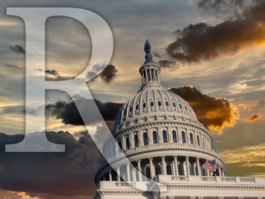Let's Give the Fed Some Competition
A Commentary By John Stossel
Pssst. Want to buy some Stossels? They’re my own currency with my face on them.
Why should you trust them?
Because I promise to redeem them for gold. And I’m reliable. I have money in the bank and a job that brings in more than I spend.
By contrast, the politicians who back American currency run an unsustainable deficit.
The Federal Reserve prints so much money that since it opened its doors in 1914, the dollar has lost more than 90 percent of its value.
OK, I won’t really sell Stossels. Americans get jailed for offering alternative currencies. The government insists on a monopoly. So even though I am unhappy about holding money whose value evaporates, there’s not much I can do about it. Printing my own dollars would be healthy competition, but the government calls it counterfeiting.
Why? Why must our government make currency competition illegal? If I did print my own money, no one would have to use it. But people could if they wanted to. Competition is generally good. Why not competition in currencies?
Most people I interviewed scoffed at the idea. They said private currency should be illegal.
But impressive thinkers disagree. In 1975, a year after he won the Nobel Prize in economics, F.A. Hayek published “Choice in Currency,”which has inspired a generation of “free banking” economists. Hayek taught us that competition not only respects individual liberty, it produces essential knowledge we cannot obtain any other way. Any central bank is limited in its access to such knowledge, and subject to political pressure, no matter how independent it’s supposed to be.
“This monopoly of government, like the postal monopoly, has its origin not in any benefit it secures for the people but solely in the desire to enhance the coercive powers of government,” Hayek wrote. “I doubt whether it has ever done any good except to the rulers and their favorites. All history contradicts the belief that governments have given us a safer money than we would have had without their claiming an exclusive right to issue it.”
Former Federal Reserve economist David Barker discussed this idea recently with me.
“There are a lot of ways that private money might be better,” Barker said. “It might have embedded chips that would make it easier to count.”
The chips would also prevent counterfeiting.
There used to be private currencies. A businessman who sold iron and tin made coins that advertised his business. The Georgia Railroad Co. also produced its own currency.
This became illegal in 1864 -- Abraham Lincoln was a fan of central banking.
People generally assume that government is careful about preserving the value of the dollar. As we’ve seen, that is far from the case. When Franklin Roosevelt became president, he raised the dollar price of gold -- from bed.
In his diary, FDR’s Treasury Secretary Henry Morgenthau Jr. wrote, “If anybody ever knew how we really set the gold price ... they would be frightened.” One day, Roosevelt was asked how he picked the change in the price of gold, and he said he increased it 21 cents because 7 was a lucky number (3 times 7).
When government monetary policy is too loose, you get hyperinflation, like in Germany in the 1920s. A more recent example is Zimbabwe, where prices rose so fast that the government printed bills with a face value of 100 trillion (Zimbabwean) dollars.
“That has never happened in the case of private competing currencies,” said Barker, who wants to abolish the Fed. “In all of those instances in world history where we’ve had (competition), we have not had rampant runaway inflation.”
Barker said the information age may break down the government’s monopoly on money.
“There are experiments going on. There’s something called Bitcoin (bitcoin.org), which is an electronic money that some people are experimenting with. The legal status is a bit unclear.”
I pointed out the irony of a former Fed economist wanting to close the Fed.
“The Federal Reserve is not the first agency of government that I would get rid of,” he said. “But one thing we’ve learned over the last several decades is that central planning does not work as well as markets.”
John Stossel is host of "Stossel" on the Fox Business Network. He's the author of "Give Me a Break" and of "Myth, Lies, and Downright Stupidity."
COPYRIGHT 2012 BY JFS PRODUCTIONS, INC.
DISTRIBUTED BY CREATORS.COM
See Other Political Commentary
See Other Commentary by John Stossel
Views expressed in this column are those of the author, not those of Rasmussen Reports. Comments about this content should be directed to the author or syndicate.
Rasmussen Reports is a media company specializing in the collection, publication and distribution of public opinion information.
We conduct public opinion polls on a variety of topics to inform our audience on events in the news and other topics of interest. To ensure editorial control and independence, we pay for the polls ourselves and generate revenue through the sale of subscriptions, sponsorships, and advertising. Nightly polling on politics, business and lifestyle topics provides the content to update the Rasmussen Reports web site many times each day. If it's in the news, it's in our polls. Additionally, the data drives a daily update newsletter and various media outlets across the country.
Some information, including the Rasmussen Reports daily Presidential Tracking Poll and commentaries are available for free to the general public. Subscriptions are available for $4.95 a month or 34.95 a year that provide subscribers with exclusive access to more than 20 stories per week on upcoming elections, consumer confidence, and issues that affect us all. For those who are really into the numbers, Platinum Members can review demographic crosstabs and a full history of our data.
To learn more about our methodology, click here.



